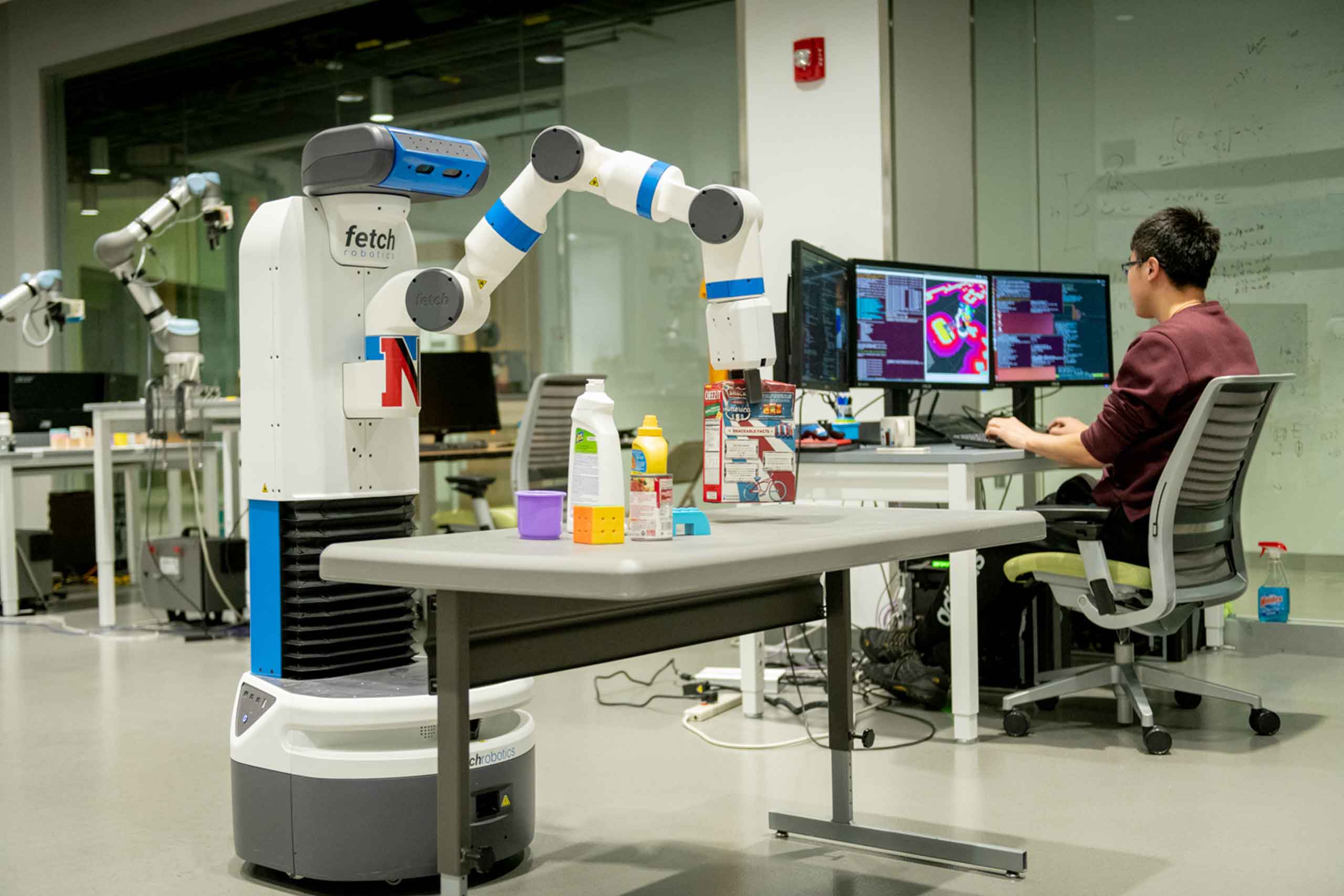





Master’s-level co-ops and internships represent an exciting next step in your career trajectory—the first opportunity to leverage both your existing professional background and the new skills and perspectives you’ve acquired through your program. Below, you’ll find information on best practices and action steps for optimizing your experience and as you look ahead to the next stage of a successful career in computer science.
Master’s-level co-ops and internships represent an exciting next step in your career trajectory—the first opportunity to leverage both your existing professional background and the new skills and perspectives you’ve acquired through your program. Below, you’ll find information on best practices and action steps for optimizing your experience and as you look ahead to the next stage of a successful career in computer science.
Master’s-level co-ops and internships represent an exciting next step in your career trajectory—the first opportunity to leverage both your existing professional background and the new skills and perspectives you’ve acquired through your program. Below, you’ll find information on best practices and action steps for optimizing your experience and as you look ahead to the next stage of a successful career in computer science.
Master’s-level co-ops and internships represent an exciting next step in your career trajectory—the first opportunity to leverage both your existing professional background and the new skills and perspectives you’ve acquired through your program. Below, you’ll find information on best practices and action steps for optimizing your experience and as you look ahead to the next stage of a successful career in computer science.
LinkedIn is an important networking tool for creating and maintaining professional connections, and we strongly encourage keeping your profile up to date when reaching out to NU alumni or other LinkedIn users. Make appointments with your co-op coordinator or Northeastern’s Employer Engagement and Career Design’s Career Studio to discuss how best to use LinkedIn to pursue your professional goals—from highlighting key skills and work experiences to developing networking strategies and locating opportunities you’re interested in.
Eligibility and considerations
While many employers hire international students or permanent residents, some (such as government contractors requiring U.S. security clearance) are unable to do so. You may choose to consider a “home country co-op” and return to your country of origin during the six-month work period. This does not affect your CPT authorization, and for some students it provides a welcome “vacation” from studying away from home. If considering this option, discuss it with your co-op coordinator as early as possible.
LinkedIn is an important networking tool for creating and maintaining professional connections, and we strongly encourage keeping your profile up to date when reaching out to NU alumni or other LinkedIn users. Make appointments with your co-op coordinator or Northeastern’s Employer Engagement and Career Design’s Career Studio to discuss how best to use LinkedIn to pursue your professional goals—from highlighting key skills and work experiences to developing networking strategies and locating opportunities you’re interested in.
Eligibility and considerations
While many employers hire international students or permanent residents, some (such as government contractors requiring U.S. security clearance) are unable to do so. You may choose to consider a “home country co-op” and return to your country of origin during the six-month work period. This does not affect your CPT authorization, and for some students it provides a welcome “vacation” from studying away from home. If considering this option, discuss it with your co-op coordinator as early as possible.
LinkedIn is an important networking tool for creating and maintaining professional connections, and we strongly encourage keeping your profile up to date when reaching out to NU alumni or other LinkedIn users. Make appointments with your co-op coordinator or Northeastern’s Employer Engagement and Career Design’s Career Studio to discuss how best to use LinkedIn to pursue your professional goals—from highlighting key skills and work experiences to developing networking strategies and locating opportunities you’re interested in.
Eligibility and considerations
While many employers hire international students or permanent residents, some (such as government contractors requiring U.S. security clearance) are unable to do so. You may choose to consider a “home country co-op” and return to your country of origin during the six-month work period. This does not affect your CPT authorization, and for some students it provides a welcome “vacation” from studying away from home. If considering this option, discuss it with your co-op coordinator as early as possible.
LinkedIn is an important networking tool for creating and maintaining professional connections, and we strongly encourage keeping your profile up to date when reaching out to NU alumni or other LinkedIn users. Make appointments with your co-op coordinator or Northeastern’s Employer Engagement and Career Design’s Career Studio to discuss how best to use LinkedIn to pursue your professional goals—from highlighting key skills and work experiences to developing networking strategies and locating opportunities you’re interested in.
Eligibility and considerations
While many employers hire international students or permanent residents, some (such as government contractors requiring U.S. security clearance) are unable to do so. You may choose to consider a “home country co-op” and return to your country of origin during the six-month work period. This does not affect your CPT authorization, and for some students it provides a welcome “vacation” from studying away from home. If considering this option, discuss it with your co-op coordinator as early as possible.
Having an understanding of the many different roles and responsibilities within computer science can help to inform your academic and experiential pursuits. Job descriptions on company websites and job boards like Indeed, Google Jobs, Glassdoor, and AngelList provide detailed information about requirements and expectations for each position, as well as the technical and professional skills needed to succeed.
Having an understanding of the many different roles and responsibilities within computer science can help to inform your academic and experiential pursuits. Job descriptions on company websites and job boards like Indeed, Google Jobs, Glassdoor, and AngelList provide detailed information about requirements and expectations for each position, as well as the technical and professional skills needed to succeed.
Having an understanding of the many different roles and responsibilities within computer science can help to inform your academic and experiential pursuits. Job descriptions on company websites and job boards like Indeed, Google Jobs, Glassdoor, and AngelList provide detailed information about requirements and expectations for each position, as well as the technical and professional skills needed to succeed.
Having an understanding of the many different roles and responsibilities within computer science can help to inform your academic and experiential pursuits. Job descriptions on company websites and job boards like Indeed, Google Jobs, Glassdoor, and AngelList provide detailed information about requirements and expectations for each position, as well as the technical and professional skills needed to succeed.
Having an understanding of the many different roles and responsibilities within computer science can help to inform your academic and experiential pursuits. Job descriptions on company websites and job boards like Indeed, Google Jobs, Glassdoor, and AngelList provide detailed information about requirements and expectations for each position, as well as the technical and professional skills needed to succeed.
Having an understanding of the many different roles and responsibilities within computer science can help to inform your academic and experiential pursuits. Job descriptions on company websites and job boards like Indeed, Google Jobs, Glassdoor, and AngelList provide detailed information about requirements and expectations for each position, as well as the technical and professional skills needed to succeed.
Having an understanding of the many different roles and responsibilities within computer science can help to inform your academic and experiential pursuits. Job descriptions on company websites and job boards like Indeed, Google Jobs, Glassdoor, and AngelList provide detailed information about requirements and expectations for each position, as well as the technical and professional skills needed to succeed.
Having an understanding of the many different roles and responsibilities within computer science can help to inform your academic and experiential pursuits. Job descriptions on company websites and job boards like Indeed, Google Jobs, Glassdoor, and AngelList provide detailed information about requirements and expectations for each position, as well as the technical and professional skills needed to succeed.

Meetup is a networking platform that allows users to coordinate events around topics of shared interest—including professional and CS-focused domains like software engineering, artificial intelligence, and data science. Active in metropolitan areas across the country, Meetups—and similar employer-generated events hosted through EventBrite—are a great way to plug into diverse and active communities of peers and potential collaborators beyond your program cohort.

Meetup is a networking platform that allows users to coordinate events around topics of shared interest—including professional and CS-focused domains like software engineering, artificial intelligence, and data science. Active in metropolitan areas across the country, Meetups—and similar employer-generated events hosted through EventBrite—are a great way to plug into diverse and active communities of peers and potential collaborators beyond your program cohort.

Meetup is a networking platform that allows users to coordinate events around topics of shared interest—including professional and CS-focused domains like software engineering, artificial intelligence, and data science. Active in metropolitan areas across the country, Meetups—and similar employer-generated events hosted through EventBrite—are a great way to plug into diverse and active communities of peers and potential collaborators beyond your program cohort.

Meetup is a networking platform that allows users to coordinate events around topics of shared interest—including professional and CS-focused domains like software engineering, artificial intelligence, and data science. Active in metropolitan areas across the country, Meetups—and similar employer-generated events hosted through EventBrite—are a great way to plug into diverse and active communities of peers and potential collaborators beyond your program cohort.
Doing research to gauge your interest in a company or a specific position is a great start, but there’s no substitute for engaging face to face when it comes to determining fit. Reaching out to employers for an informational interview demonstrates initiative, confidence, and willingness to learn—about the company, the sector or industry they work in, and what it takes to succeed in the role you’re considering.
To discuss any of the above strategies or for any career-related inquiries, meeting regularly with your co-op coordinator is strongly encouraged.
Doing research to gauge your interest in a company or a specific position is a great start, but there’s no substitute for engaging face to face when it comes to determining fit. Reaching out to employers for an informational interview demonstrates initiative, confidence, and willingness to learn—about the company, the sector or industry they work in, and what it takes to succeed in the role you’re considering.
To discuss any of the above strategies or for any career-related inquiries, meeting regularly with your co-op coordinator is strongly encouraged.
Doing research to gauge your interest in a company or a specific position is a great start, but there’s no substitute for engaging face to face when it comes to determining fit. Reaching out to employers for an informational interview demonstrates initiative, confidence, and willingness to learn—about the company, the sector or industry they work in, and what it takes to succeed in the role you’re considering.
To discuss any of the above strategies or for any career-related inquiries, meeting regularly with your co-op coordinator is strongly encouraged.
Doing research to gauge your interest in a company or a specific position is a great start, but there’s no substitute for engaging face to face when it comes to determining fit. Reaching out to employers for an informational interview demonstrates initiative, confidence, and willingness to learn—about the company, the sector or industry they work in, and what it takes to succeed in the role you’re considering.
To discuss any of the above strategies or for any career-related inquiries, meeting regularly with your co-op coordinator is strongly encouraged.











